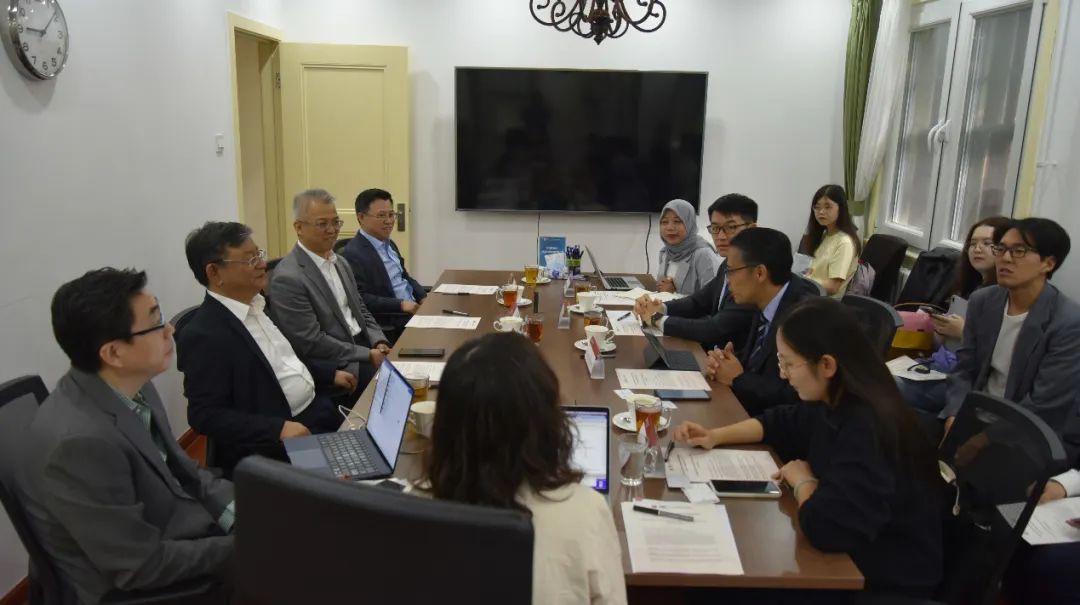
The 5th lecture of Adventus Amicorum series was held on September 26, 2023 at No. 66 Yannanyuan. Yoga Affandi, executive director of the Head of Bank Indonesia Institute (BI Institute), shared his thoughts on the topic, “Economic Development and Monetary Policy in Indonesia.”The lecture was moderated by Kong Tao, senior research fellow of the Institute of Social Science Surveys of Peking University. Other participants included Prof. Jiang Shigong, director of the Office of Humanities and Social Sciences; Prof. Tang Shiqi, director of the Institute of Area Studies (IAS); Prof. Wang Dong, vice director of the Office of Humanities and Social Sciences; and Prof. Zhai Kun, deputy director of IAS.
Before the lecture, Prof. Jiang Shigong and Prof. Tang Shiqi delivered welcome speeches. On behalf of Peking University, Prof. Jiang extended a sincere welcome to Affandi and the delegation from the BI Institute. He said that Peking University had always been an important academic center for area studies in China, especially Southeast Asian studies, which has had a long history at PKU and has made various achievements. He said he looked forward to more cooperation with the BI Institute in the future. Prof. Tang Shiqi extended his welcome and greetings to Affandi and his delegation. He said that Southeast Asia played an important role in China’s foreign relations and that Southeast Asia studies were of great significance. He expressed his hope for continued cooperation between the two institutions and that they would jointly promote academic communication in the future. Affandi also said that he liked the campus environment and cultural atmosphere of Peking University and looked forward to follow-up exchanges and discussions.
Affandi structured his lecture around three key themes: the “Vision and Mission of the BI Institute”, “Four Main Pillars of the BI Institute” and “Organizational Structure and Publications of the BI Institute.” He began by introducing his work and research experience at Bank Indonesia. Because he has spent most of his working life at Bank Indonesia, he has a deep understanding of the work of the BI Institute. He emphasized that the vision of BI Institute was to become a prominent world-class learning, study and research institution that strategically contributed to fostering quality, prosperity and impartial human resources with integrity. As a consequence, the mission of the BI Institute is to provide an atmosphere conducive to learning, study and research through the creation of competent human resources in the economic and financial sectors using best faculty management and mutually beneficial strategic partnerships with the support of high-quality infrastructure.
Next, Affandi introduced the roadmap of the BI Institute to the audience, in which there have been three phases: “Laying the Foundation”, “Accelerating” and “Advancing.” In the first two phases, BI Institute integrated resource networks, established standardized learning courses and supporting infrastructure, carried out strategic cooperation with well-known international institutions, and successfully published international publications and books. According to Affandi, they were gradually realizing the goal of the third phase, that is, expanding international cooperation networks and publishing influential academic frontier articles. Therefore, Affandi also expressed his hope to establish a cooperative relationship with PKUIAS.
Then, he introduced four pillars which he said were necessary to realize the vision and mission of the BI Institute. The first pillar was learning, which means providing high-quality and inclusive learning, especially in the region of the economics of money markets, financial system stability, payment systems and digital currency management. The second pillar was research, standing for completing research on the latest issues and development strategies in economic growth, monetary policy, financial system stability, financial markets, payment systems and leadership management. For the third pillar, Affandi explained it as being strategic partnerships with well-known research institutions at home and abroad to support the high-quality learning and research projects mentioned above, while increasing the visibility and influence of Indonesia and Bank Indonesia in the world. The fourth pillar was public exposure, which, in the view of Affandi, required the BI Institute to involve the public in its activities by providing information on its official website, publications, and organizing inclusive programs.
After explaining the four pillars of the BI Institute, Affandi focused on its internal organizational structure. The BI Institute includes institutions such as a Research Center, Academy Development Group and Learning Operations Group, which are respectively responsible for the research, strategic partnership and learning pillars mentioned earlier. At the same time, the Bank Indonesia Institute also has an honorary council, advisory committee and expert panel to help the institute better carry out its work. During the discussion session, the discussants engaged Affandi in an erudite exchange about the implications arising from his lecture.
Prof. Zhai Kun said that Peking University had a long history in Southeast Asia research, and had built a comprehensive research team as well as a sound academic training system for Masters and PhD degree-seeking students. He said that, in the future, he hoped to learn from the BI Institute. At the same time, Peking University was establishing a research network on sustainable development in Southeast Asia and hoped to cooperate with the Bank Indonesia Research Institute in this field in the future. Other discussants at the meeting also expressed their views on the possibilities for future research cooperation between the two sides.


